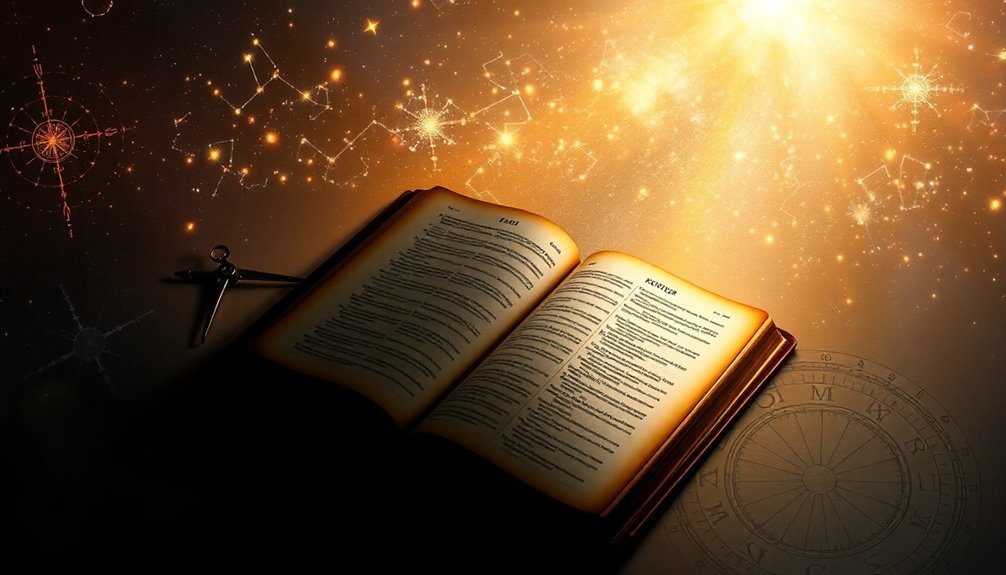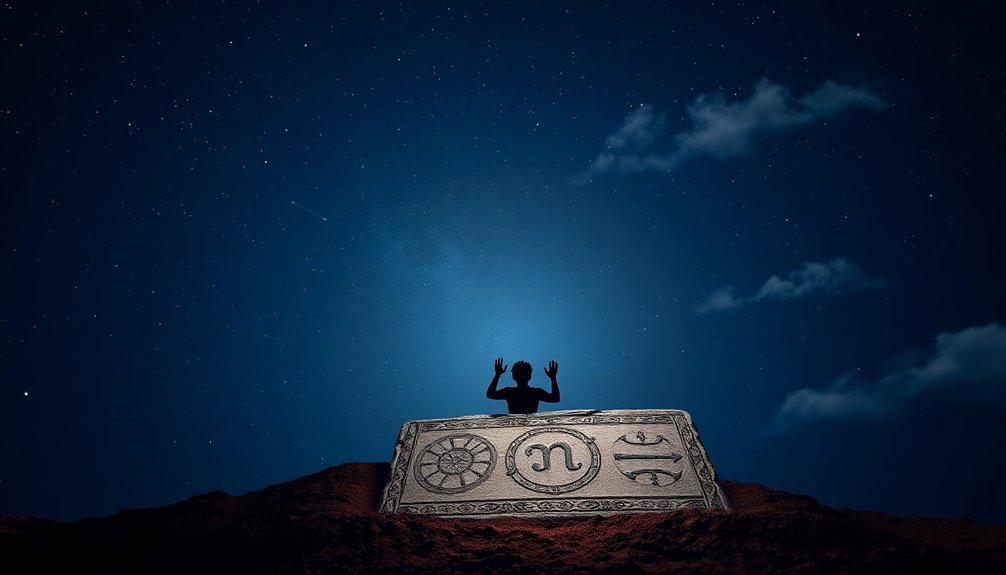Astrology is clearly condemned in the Bible, categorized as divination and a distraction from trusting God's guidance. Verses like Leviticus 19:26 and Deuteronomy 18:10-14 warn against these practices, labeling them as detestable. The Bible emphasizes that God holds sovereignty over the stars and celestial bodies, as seen in Job and Psalm 147:4. While the Magi in Matthew 2 are often discussed, their actions don't endorse astrology but reveal God's divine plan. Understanding these biblical perspectives may reshape your views on astrology's place in faith. There's so much more waiting for you to uncover.
Key Takeaways
- The Bible explicitly condemns astrology as a form of divination, referencing practices in Leviticus 19:26 and Deuteronomy 18:10-14.
- Biblical texts highlight God's sovereignty over celestial bodies, contrasting divine authority with the failures of astrologers in Isaiah 47:13.
- Astrology was prevalent in ancient Near Eastern cultures, with Babylonians creating horoscopes and celestial charts around 2000 BC.
- A modern resurgence of astrology, especially among younger generations, poses challenges for congregations emphasizing biblical teachings against divination.
- Trusting in God's guidance through prayer and scripture is encouraged over reliance on astrological predictions for decision-making.
Introduction

Astrology has long been a topic of intrigue, especially when explored in the context of the Bible. While astrology involves forecasting earthly events based on celestial movements, biblical texts categorize it as a form of divination, explicitly condemning it in passages like Leviticus 19:26 and Isaiah 47:13. This condemnation underscores the belief that reliance on astrology can divert you from seeking guidance from God.
You might notice that the Bible contains narratives hinting at astrological symbols, like the Magi who followed a star to find Jesus. This raises questions about astrology's role in biblical contexts. However, historical evidence shows that astrology was prevalent in ancient cultures surrounding Israel, where people viewed celestial bodies as influential forces in human affairs.
Key biblical figures, such as Daniel, illustrate that understanding dreams and signs comes from reliance on God rather than astrology. Their stories emphasize the limitations of astrological interpretations.
Ultimately, while the Bible references astrology, its overall stance warns against engaging in such practices, encouraging you to prioritize divine guidance over the allure of astrology.
Biblical Astrology References

When you look at the Bible, you'll find both primary and secondary references to astrology that highlight its complex role in scripture.
For instance, passages like Job and Genesis emphasize the significance of celestial bodies, while others caution against reliance on astrological practices.
Understanding these references can help you navigate the nuanced relationship between astrology and biblical teachings.
Primary Bible References
While the Bible presents various perspectives on celestial events and their interpretations, it often critiques the practice of astrology. In Isaiah 47:13, the Bible says it condemns reliance on astrologers for predictions, highlighting a clear disapproval of such practices.
The Old Testament further emphasizes this stance in Leviticus 19:26, where it explicitly forbids any forms of divination, including astrology. This prohibition illustrates a broader concern about seeking knowledge from celestial bodies rather than divine guidance.
Daniel 2:2 adds to the discussion by mentioning magicians, enchanters, and astrologers in Babylon, showcasing their roles within ancient divination practices. However, Ezekiel 12:24 reinforces the biblical message by declaring an end to false visions and divination, further denouncing astrology's influence.
Interestingly, the Magi in Matthew 2:1-12, who followed a star to find Jesus, provoke debate about their potential association with astrology. While they seem to use celestial signs, the context raises questions about the biblical acceptance of such practices.
Ultimately, these primary references illustrate a complex relationship between astrology and biblical teachings, often leaning toward condemnation.
Secondary Bible References
The Bible's treatment of celestial bodies offers intriguing insights into how these references relate to broader themes of divine authority and human understanding. In Job, celestial constellations like Orion and the Pleiades highlight God's mastery over creation, emphasizing His sovereignty.
Psalm 147:4 reinforces this by stating that God numbers and names the stars, showcasing His control over the universe.
However, the Bible also critiques those who practice divination, such as astrologers. In Isaiah 47:13, their inability to predict events accurately calls into question astrology's reliability. This critique suggests that while astrology provides a framework for understanding the heavens, it ultimately falls short of divine insight.
Deuteronomy 18:9-14 warns against adopting such practices, labeling them detestable to God, which further underscores the tension between celestial observation and faith.
Interestingly, the Magi's journey in Matthew 2:1-2 shows a significant biblical connection between celestial phenomena and major events, like the birth of Jesus. This moment illustrates a nuanced relationship where the signs of the Zodiac can lead to divine revelation, yet they must be approached with caution and discernment.
Astrology's Ancient Near Eastern Roots

Astrology's roots in the Ancient Near East reveal a fascinating interplay between celestial observations and human affairs. The Babylonians, for instance, developed astrological systems around 2000 BC, allowing astrologers who make predictions to interpret the movements of celestial bodies. These early practitioners practiced divination or sought guidance to influence decisions in governance and daily life.
Astrology was deeply intertwined with religious beliefs, as cultures like the Egyptians and Canaanites associated celestial bodies with their deities. Cuneiform tablets from Babylon show how Chaldeans created horoscopes and celestial charts, emphasizing the significance of astrology in guiding kings and societies.
The zodiac system, rooted in early Near Eastern astronomy, categorized astrological signs based on constellations linked to agricultural cycles and seasonal changes. Biblical references to astrology, including the mention of astrology in the context of the prophet Daniel, highlight its prevalence in the cultural milieu of the time.
While some viewed these practices within the framework of idolatry and divine judgment, they undeniably shaped the understanding of celestial influences on earthly affairs in the ancient world.
Astrology's Cultural Significance Today

With roots stretching back to ancient civilizations, astrology has evolved dramatically and found new life in today's cultural landscape. A Pew Research survey from 2018 revealed that 29% of U.S. adults believe in astrology, including 26% of Christians. This resurgence, especially among younger generations, underscores astrology's cultural significance in contemporary society.
Digital technology and social media have played pivotal roles in this revival, making it easier than ever to share horoscopes and astrological insights. Many people now practice astrology as a tool for personal growth and self-exploration, integrating it into their wellness routines.
It's not just about predicting the future; it's a way to understand oneself better. Moreover, modern interpretations often focus on relationship dynamics, with compatibility assessments based on zodiac signs becoming popular among those seeking guidance in their personal lives.
Despite ongoing debates about its validity, astrology continues to resonate with many as both a form of entertainment and a source of insight. This reflects a broader cultural shift towards alternative spiritual practices, where astrology in the Bible might serve as a historical backdrop to its modern applications.
Astrology and Biblical Authority

When you consider astrology in light of biblical authority, you'll find clear contradictions with Scripture.
The Bible explicitly warns against seeking guidance from celestial bodies, emphasizing that true wisdom comes from God alone.
Debunk Astrology Misconceptions
Many people mistakenly associate astrology with biblical teachings, but the truth is that scripture explicitly condemns it. The Bible warns against the sin of divination, clearly stating that God hasn't permitted His followers to practice sorcery or divination.
Passages like Leviticus 19:26 and Isaiah 47:13 highlight the prohibition against such practices, linking them to idolatry and false prophecies.
While the Magi in the New Testament are often viewed as astrologers who make predictions, their journey was guided by a specific star announcing Christ's birth—not an endorsement of astrology.
In fact, biblical narratives demonstrate the inadequacy of astrologers; for instance, in Daniel 2:10, they fail to interpret the king's dreams, illustrating that true understanding comes solely from God.
Many Christians recognize that astrology is incompatible with their faith. They believe that scripture should guide their understanding of life's events rather than relying on celestial signs.
Astrology Contradicts Biblical Teachings
Astrology fundamentally contradicts biblical teachings, as the Bible clearly condemns its practices. In passages like Leviticus 19:26 and Deuteronomy 18:10-14, God warns against engaging in astrology and divination, asserting that these actions violate His commands.
The Old Testament associates astrology with idolatry and false prophecies, critiquing those who rely on magicians for guidance in Isaiah 47:13-14.
Biblical figures, such as Daniel, illustrate the futility of astrology. When he interpreted dreams and visions, he showcased God's sovereignty over celestial influences, proving that human interpretations fall short without divine guidance (Daniel 2:27).
Even in the New Testament, while the Magi followed a star, their actions don't endorse astrology; instead, they reveal God's plan through celestial events.
Engaging in astrology represents a departure from the reliance on God's wisdom and guidance. James 1:5 encourages believers to seek divine counsel, highlighting that true understanding comes from God, not the stars.
Astrology's Impact on Decision-Making

When you consider how astrology influences your everyday decisions, it's essential to recognize its historical context and biblical stance.
Many people have turned to celestial signs for guidance, but the Bible encourages you to seek wisdom from God instead.
Understanding this can help you make choices that align with your faith and community values.
Guidance in Daily Choices
Frequently, people look to astrology for guidance in their daily decision-making, believing that celestial patterns can influence their choices. However, the Bible explicitly condemns this practice. Scriptures like Isaiah 47:13 warn against relying on astrologers for direction, as it ties closely to divination, which God prohibits. True wisdom comes from God alone, as stated in James 1:5.
Historically, ancient civilizations used astrology to navigate their lives, but biblical narratives often showcase astrologers as ineffective. For instance, in Daniel 2:10, Babylonian astrologers fail to interpret dreams, while Daniel succeeds by relying on divine insight. This narrative emphasizes that seeking astrological advice conflicts with biblical teachings, urging believers to trust in divine providence instead, as seen in Proverbs 3:5-6.
Engaging with astrology not only diverts you from God's guidance but also risks entanglement with occult practices, as outlined in Deuteronomy 18:10-14.
Ultimately, discerning your choices in alignment with biblical principles yields a more reliable and fulfilling path than following astrological influences. Trusting God's guidance ensures you make decisions grounded in faith, rather than the uncertain whims of the stars.
Congregational Guidance on Astrology
In today's world, many congregations face the challenge of addressing the rising interest in astrology among their members. While some may turn to astrologers to tell their futures, the Bible clearly warns against such divination practices. Leviticus 19:26 reminds us that relying on astrology contradicts God's purpose for our lives.
Instead, you're called to seek wisdom from God through prayer and biblical teachings, as highlighted in James 1:5.
Biblical narratives, particularly Daniel's encounters with wise men and astrologers, underscore the futility of looking to celestial signs for guidance. These stories illustrate that true insight comes from divine revelation, not from astrological predictions.
Engaging with astrology can lead to confusion and misalignment with your faith, as Deuteronomy 18:9-14 cautions against detestable practices.
Congregational guidance should focus on helping you root your identity and decisions in your relationship with God. Encourage yourself and others to seek divine direction rather than relying on astrological interpretations.
Astrology's Biblical Implications Explored

While many might be drawn to astrology for guidance, the Bible presents a clear stance against such practices. In Leviticus 19:26, it explicitly forbids consulting astrological signs, urging you to seek wisdom from the Lord your God instead.
This warning continues in Deuteronomy 18:9-14, where you're cautioned against adopting the detestable divination practices of surrounding nations.
Isaiah 47:13 critiques astrologers for their failure to predict the future, highlighting the futility of placing your trust in the stars and planets.
Although the Magi followed a star to find Jesus in the New Testament, their actions provoke debate about whether they genuinely aligned with biblical principles or simply acted on historical customs.
Ultimately, the Bible emphasizes reliance on God for understanding and wisdom rather than celestial influences.
Instead of looking to the heavens, it directs you to turn to scripture and prayer for guidance, reinforcing the belief that true insight comes from your relationship with the Lord your God.
In navigating life's uncertainties, prioritizing faith over astrology leads to deeper spiritual fulfillment.
Additional Resources

For anyone seeking to dive deeper into the relationship between astrology and biblical teachings, a variety of resources are available. You can explore historical contexts that reveal how astrologers come forward in ancient cultures surrounding Israel, often practiced divination that the Bible explicitly condemns.
Works that analyze passages like Leviticus 19:26 and Isaiah 47:13-14 provide insight into the biblical rejection of celestial signs as guidance.
The New Testament offers a unique perspective, particularly with the magi from the East who followed a star to find Jesus. This event has sparked debate among scholars about its implications—was it a positive engagement with astrology or merely a cultural artifact?
Books and articles that focus on these themes can help you navigate the complexities of astrology's role in biblical narratives. You'll find studies that highlight the futility of astrology, as seen in Daniel 2:27 and 2 Kings 21:6, alongside discussions on its association with idolatry.
Frequently Asked Questions
Does the Bible Support Astrology?
The Bible doesn't support astrology. Instead, it emphasizes reliance on God for guidance and understanding.
You'll find passages that clearly warn against seeking knowledge from celestial bodies or diviners, highlighting the futility of such practices.
By focusing on faith and divine revelation, you can find true direction in life.
Embracing spiritual teachings rather than astrological predictions strengthens your relationship with God and leads to a more fulfilling path.
Can Christians Believe in Astrology?
You can believe in astrology if you choose, but it's important to consider the implications.
Many Christians feel it conflicts with their faith, emphasizing a reliance on God for guidance.
While some might find comfort in astrological insights, you should weigh that against biblical teachings.
Ultimately, it's about your relationship with God and what you feel aligns with your values.
Reflect on how astrology might influence your spiritual journey and make your choice wisely.
What Does the Bible Say About Numerology and Astrology?
When you explore numerology and astrology, you'll find that the Bible addresses these topics indirectly.
While it doesn't explicitly mention numerology, numbers often symbolize deeper meanings.
Astrology, on the other hand, gets condemned in various scriptures, emphasizing reliance on God for guidance instead of celestial bodies.
You should focus on seeking wisdom from God rather than looking to the stars for direction, as true understanding comes from divine insight.
Was Astrology Around Before Jesus?
Yes, astrology was definitely around before Jesus.
You'd find evidence of its practice in ancient civilizations like Babylon, where people interpreted celestial events as important omens.
The Magi, who visited Jesus after his birth, were likely astrologers, highlighting astrology's significance in that era.
Ancient Egyptians and Greeks also used astrology for various purposes, showing it was a well-established practice long before the New Testament was written.










